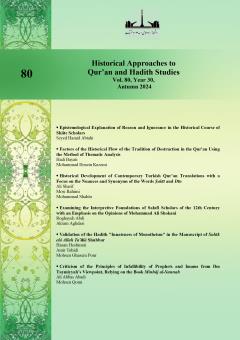Criticism of the Principles of Infallibility of Prophets and Imams from Ibn Taymiyyah’s Viewpoint, Relying on the Book Minhāj al-Sunnah
Subject Areas :
Ali Abbas Abadi
1
*
![]() ,
Mohsen Ghomi
2
,
Mohsen Ghomi
2
1 - PhD in Islamic Theology, and lecturer at Qom University, Qom, Iran (corresponding author).
2 - Associate Professor, Baqir al-Olum University, Qom, Iran.
Keywords: Infallibility, Basics, Ibn Taymiyyah, Minhāj al-Sunnah, Allameh Helli. ,
Abstract :
Ibn Taymiyyah is the most influential figure in the history of Salafism, who has expressed opinions in various areas of belief, and his opinions have been noticed and obeyed by his followers. Among other things, he discussed the idea of infallibility as one of the pillars of the problem of prophethood and imamate and questioned this doctrine. He violates almost all the foundations and proofs of infallibility and finally, he does not accept any absolute infallibility for prophets and imams. On the other hand, he tries to find an alternative to the infallibility of the divine parents by proposing and proving the theory of "total infallibility of the nation". He questions three important bases: the definition and affairs of the Imamate, the rule of grace, and the superiority of the Imams (peace be upon them) in order to destroy the useful evidence of infallibility. But none of his problems are related to these three bases, and precise and convincing answers are given to each of them. His total infallibility theory also has no solid evidence and cannot be proven and questions the foundations and evidences of the infallibility of divine saints.

